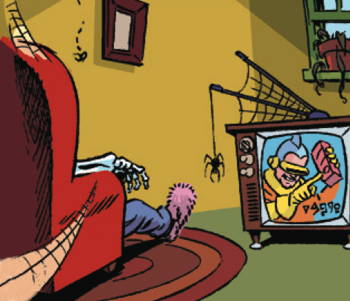September 2020
September 30, 2020
Reverse Streaking
"Reverse streaking" is defined as the act of running clothed through a nudist colony. During the 'streaking epidemic' that hit college campuses in 1973 and 1974, there were scattered reports of 'reverse streaking'.
Calgary Herald - Apr 18, 1974

Portland Daily Register - Mar 9, 1974
Posted By: Alex - Wed Sep 30, 2020 -
Comments (1)
Category: Fads, 1970s
Muffin the Mule
Non-talking puppets with uninterrupted narration by a weird lady: pure kiddie gold!Or, as the urban legend has it: "There! That oughta hold the little bastards!"
The Wikipedia page.
Posted By: Paul - Wed Sep 30, 2020 -
Comments (1)
Category: Puppets and Automatons, Television, United Kingdom, Twentieth Century
September 29, 2020
Death by licorice
The New England Journal of Medicine recently reported on a case of a 54-year-old man who died by eating too much licorice:The glycyrrhetinic acid caused his potassium levels to drop, which then caused his heart to stop.
It would have been weirder if he had been crushed by 16 tons of licorice. But licorice overdose is a weird way to die nevertheless.
Posted By: Alex - Tue Sep 29, 2020 -
Comments (3)
Category: Death, Candy
Where Would You Hide Two Elephants?
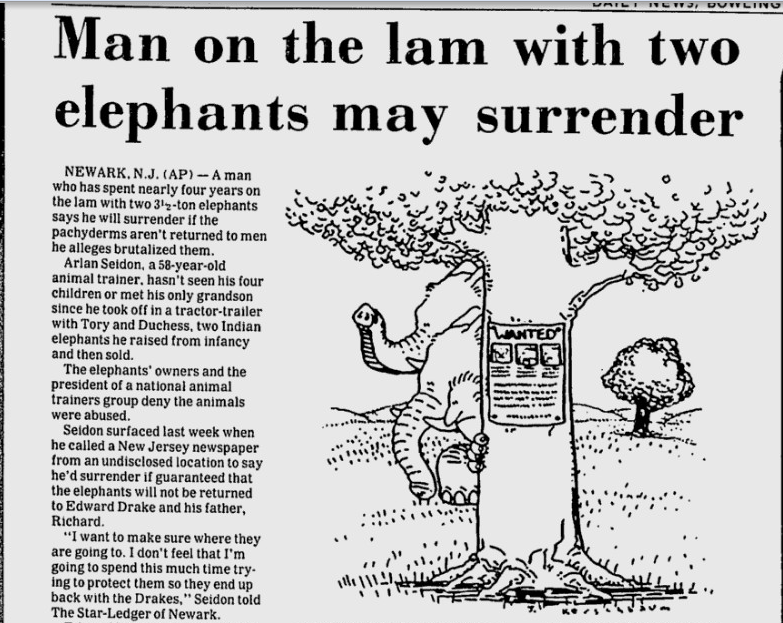

Source.
Posted By: Paul - Tue Sep 29, 2020 -
Comments (6)
Category: Animals, Crime, Eccentrics, 1980s
September 28, 2020
The jokes of Immanuel Kant
We've posted before about jokes from unlikely sources, such as the jokes of Lord Aberdeen, and the jokes of King George VI. Now, along similar lines, comes a book from Robert Clewis — Kant's Humorous Writings . It's a collection of 30 jokes told by the German philosopher Immanuel Kant.
Kant and humor are, I'm guessing, two things most people wouldn't associate together. And after reading Clewis's book, their opinion on this subject may not change.
Clewis freely admits this. In his preface he notes that he was "once tempted to call the book Kant’s Humorous Writings: I Wish They Existed." He goes on to say, "Readers may find the jokes to be boring or even offensive. No promise is being made that the reader will find the jokes amusing."
But Clewis also insists that the book itself isn't a joke. Nor was his intent to lampoon Kant. As he describes it, while studying Kant he realized that the philosopher's work included occasional jokes. His curiosity aroused, he thought it would be interesting to collect these jokes together, as a way of understanding what Kant thought was amusing.
Each joke is accompanied by an illustration drawn by artist Nicholas Ilic. So it's very much a book geared for a general audience. (Admittedly, an audience who appreciates offbeat, erudite material). Personally I think it seems like a great coffee table book. But then, I'm strange that way.
I've reproduced two of Kant's jokes, as well as Clewis's explanation of them, below.
Amazon link
There was once a young merchant who was sailing on his ship from India to Europe. He had his entire fortune on board. Due to a terrible storm, he was forced to throw all of his merchandise overboard. He was so upset that, that very night, his wig turned gray.
Explanation:
This joke comes from the Critique of the Power of Judgment (1790), one of Kant's three Critiques. He contrasts this version with another version: the merchant's hair turns gray. But in that version, we listeners or readers become more concerned and involved. We empathize with the merchant and feel his pain more than in the first version. When it's just a wig, we are in a better position to find the story amusing. We hear the narrative as a joke rather than as descriptive speech, a real story about the world that can be either true or false.
Kant thinks that when we hear or read a joke as a joke, we need to be removed from the situation or story; we cannot have something at stake in it. He calls this disinterestedness, which turns out to be a key principle in his aesthetic theory and account of beauty. "Taste is the faculty for judging an object or a kind of representation through a satisfaction or dissatisfaction without any interest. The object of such a satisfaction is called beautiful." While the humorous is not the same as the beautiful, Kant thinks that our response to both of them requires a kind of disinterestedness. A notion of disinterestedness can be found in the writings of Shaftesbury (Anthony Ashley Cooper) (1651–1713) and other eighteenth-century aesthetic theorists. Today the notion of disinterestedness remains controversial. Some theorists think that the idea can be better captured by the concept of absorbed attention or focus.
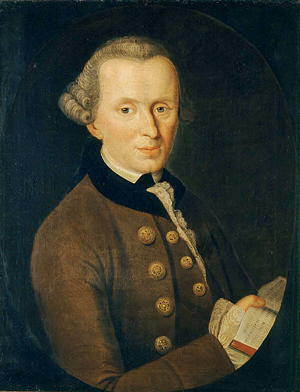
Immanuel Kant
A man's rich relative dies. Suddenly he is rich. To honor his relative, the man wants to arrange a solemn funeral service. But he keeps complaining that he can't get it quite right.
"What's the problem?" someone asks.
"I hired these mourners, but the more money I give them to look grieved, the happier they look."
Explanation:
This is a second joke from the Critique of the Power of Judgment. Kant is using it to illustrate his incongruity theory of humor. When we learn that the mourners are happy because they are getting paid, he says, our expectation is suddenly "transformed into nothing."
The philosophical underpinning is that there are at least two levels of satisfaction at work: we feel sadness, joy, etc. (first-order satisfaction) and then can approve or disapprove of it using reason (second-order). A man can be glad that he is receiving an inheritance from a deceased relative, yet disapprove of his gladness. "The object can be pleasant, but the enjoyment of it displeasing."
The joke turns on something similar happening with the mourners. They are so happy that they are getting paid (second-order) that they are no longer able to look sad (first-order).
There is a similar anecdote in Plato's Ion, a dialogue about a professional reciter (a "rhapsode") named Ion, who aimed at moving his audience. Ion says that when he looks out at the audience and sees them weeping, he knows he will laugh because it has made him richer, and that when they laugh, he will be weeping about losing the money.
Posted By: Alex - Mon Sep 28, 2020 -
Comments (2)
Category: Humor, Jokes, Philosophy, Books
S&H Green Stamps Motorboat Redemption
Folks of a certain age recall "trading stamps," tokens with a certain value given out to shoppers when they made a purchase.This site has a nice summary of the phenomenon, with lots of pictures of pages from the redemption catalog.
Here's an ad from 1968 which reveals you could get a Chrysler motorboat with Green Stamps.
Source.
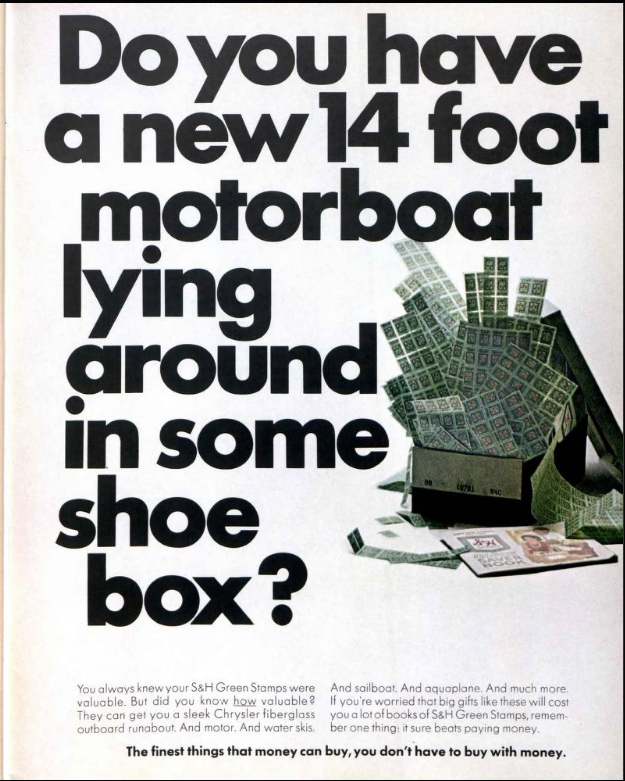
I got curious about how many books of stamps that might take. So I did some very rough calculations, fudging the different years, etc.
This site reveals that a similar boat cost about $1500.00 when new in 1969.
In the catalog at the previous link, an Admiral Color TV demands 150 books.
Here's the likely price in dollars of such an item, as seen below.

So the boat cost six times a TV, and might, I'm guessing, demand 900 books of stamps. However, I also read that each filled book was worth $1.20, so that would require 1,250 books!
That's a lot of weekly shopping trips to your local IGA, since you got only a handful of stamps with each purchase. I wonder how many people ever took advantage of the offer.
Posted By: Paul - Mon Sep 28, 2020 -
Comments (5)
Category: Boats, Business, Loyalty Programs, Shopper Incentives, Coupons and Other Discounts, Television, 1960s, 1970s
September 27, 2020
Health Jolting Chair
Oliver Halsted was granted a patent for an "exercising machine" in 1844. It was later marketed as the Health Jolting Chair. AKA the "wake-up chair." By pulling the levers on the side, it would bounce up and down. It was said to be a panacea for "dyspepsia, liver complaint, low spirits, general debility, constipation, 'so-called malaria,' jaundice, melancholia, and anemia."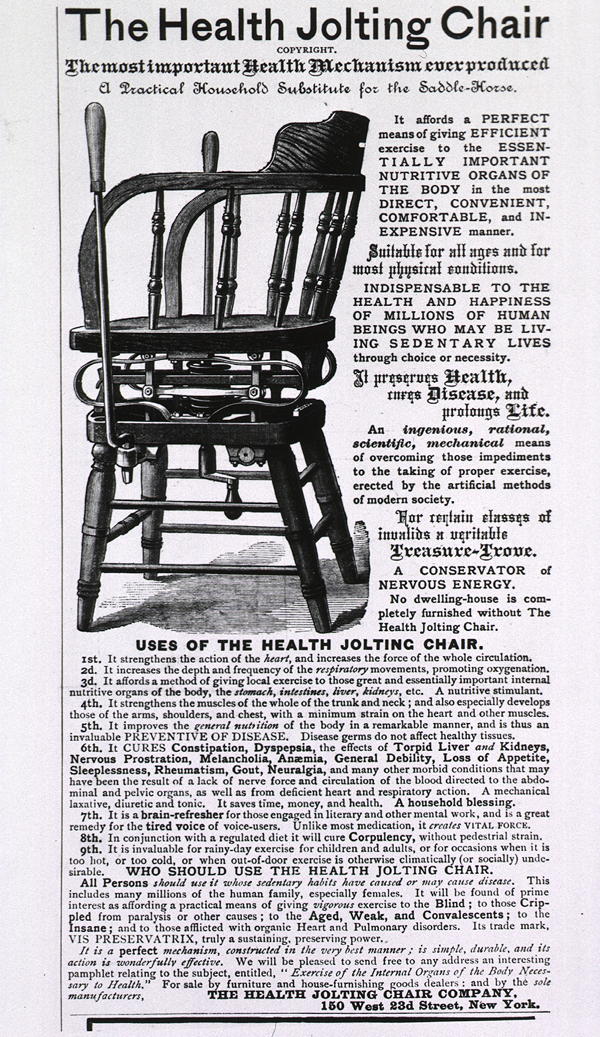
Image source: Natl Lib of Medicine
Posted By: Alex - Sun Sep 27, 2020 -
Comments (0)
Category: Exercise and Fitness, Health, Inventions, Patents, Nineteenth Century
Follies of the Madmen #489
Nightmare depiction of a leering middle-aged man convinces kids to drink horrid-tasting stuff.
Source.
Posted By: Paul - Sun Sep 27, 2020 -
Comments (3)
Category: Food, Children, 1950s, Fictional Monsters
September 26, 2020
The Sleepwalking Bandsman
— Hilary Evans, "The Sleepwalking Bandsman," The Skeptic, 16(2), Winter 2004.
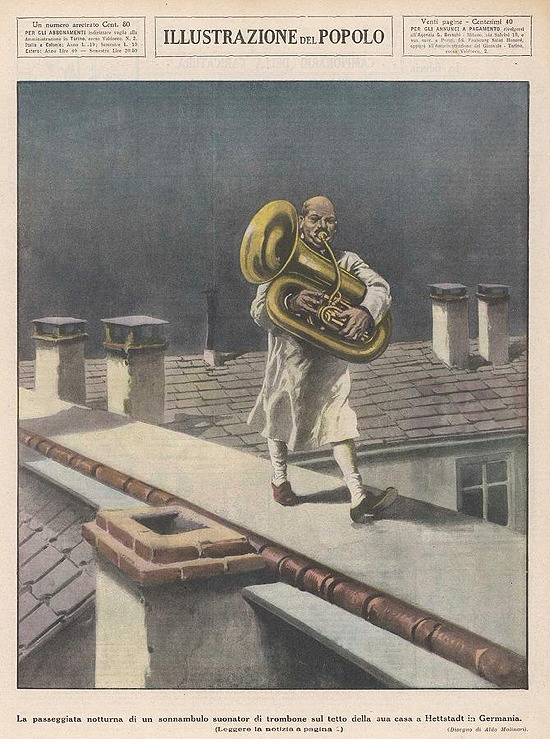
The nighttime walk of a sleepwalking trombone player on the roof of his house in Hettstadt, Germany.
Posted By: Alex - Sat Sep 26, 2020 -
Comments (3)
Category: Sleep and Dreams, 1930s
I Was a Teen-Age Caveman
Posted By: Paul - Sat Sep 26, 2020 -
Comments (2)
Category: Antiques, Anachronisms and Throwbacks, Antisocial Activities, Music, Violence, Dinosaurs and Other Extinct Creatures, 1950s
| Get WU Posts by Email | |
|---|---|

| Who We Are |
|---|
| Alex Boese Alex is the creator and curator of the Museum of Hoaxes. He's also the author of various weird, non-fiction books such as Elephants on Acid. Paul Di Filippo Paul has been paid to put weird ideas into fictional form for over thirty years, in his career as a noted science fiction writer. He has recently begun blogging on many curious topics with three fellow writers at The Inferior 4+1. Chuck Shepherd Chuck is the purveyor of News of the Weird, the syndicated column which for decades has set the gold-standard for reporting on oddities and the bizarre. Our banner was drawn by the legendary underground cartoonist Rick Altergott. Contact Us |
